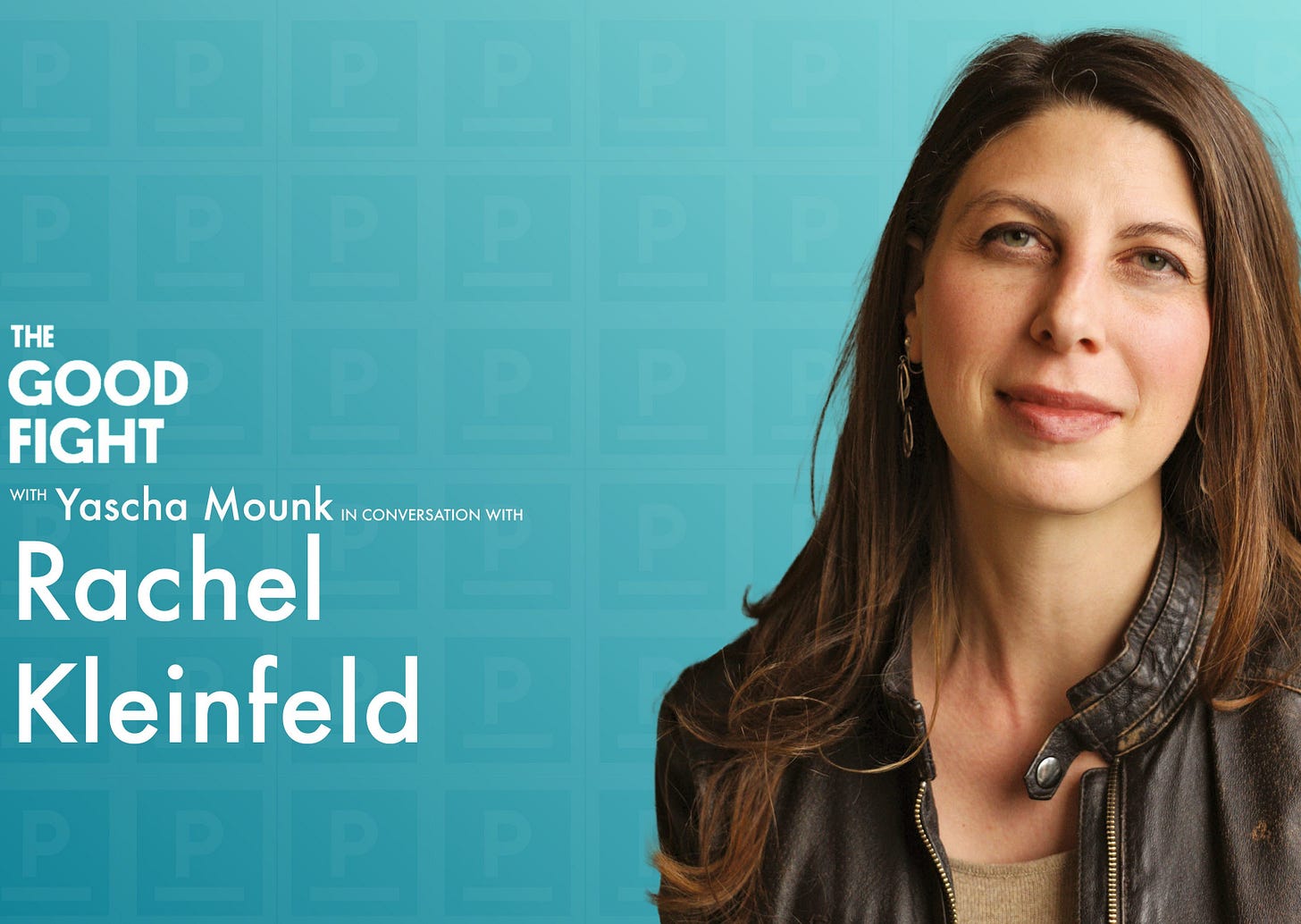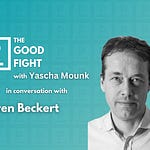Dear Readers and Listeners,
You have become accustomed to getting a weekly interview with a major thinker into your inbox; you will continue getting these every Saturday, whether or not you are a subscriber. But we are also expanding The Good Fight podcast by adding topical conversations, which are more back-and-forth in nature; occasional debates about major issues; and a monthly mailbag episode. Consider this “emergency podcast” about the attempted assassination of Donald Trump, and the thread of political, with the excellent Rachel Kleinfeld, a preview of some of what is to come.
If you want access to all of my writing, as well as to all the new content we are adding to The Good Fight, please become a paying subscriber today. (And if you are already a paying subscriber of Persuasion, your existing subscription now includes access to all of this new content as well; no further action required.)
Thank you for supporting the mission,
Yascha
P.S: In the next couple of days, when the pressures of the news cycle finally subsides a little–or so we all should hope–I will finally send my official launch post!
P.P.S: Dieses Interview wird es in den nächsten Tagen auch auf deutsch geben; um ihn direkt in Ihrer Mailbox zu erhalten, abonnieren Sie sich bitte heute! 🇩🇪 Cet interview sera également disponible en français dans les prochains jours; pour le recevoir directement dans votre boîte mail, veuillez vous abonner ici. 🇫🇷
Rachel Kleinfeld is a senior fellow in the Democracy, Conflict and Governance Program at the Carnegie Endowment for International Peace. Kleinfeld’s latest book is A Savage Order: How the World's Deadliest Countries Can Forge a Path to Security.
In this week’s conversation, Yascha Mounk and Rachel Kleinfeld discuss why political violence has been on the rise in recent years; which important resilience factors make America resistant to a civil war; and how individuals can contribute, as voters and in their communities, to lowering the probability of political violence.
This conversation was recorded on July 14th, 2024. The transcript has been condensed and lightly edited for clarity.
Yascha Mounk: Obviously, we convened in a rush because of yesterday's assassination attempt on Donald Trump—an assassination attempt that, as best we know at this point, was quite close to succeeding. The assassin managed to graze Donald Trump's ear. If Trump hadn't turned at the last second to look at the chart that he was presenting to his audience, the bullet may well have hit him in a way that would have been life-threatening.
You're an expert on political violence around the world who has started to talk about the United States in recent years because the potential for political violence has increased here. Let's start with where the danger is right now. Why is it that this is a moment that's so dangerous for political violence in general and why is it that an event like yesterday’s has the potential, but not the certainty, of pushing us further towards a spiral of political violence?
Rachel Kleinfeld: America, unfortunately, has a long history of political violence and a pretty significant one for a democracy as strong and consolidated as we are. We've had episodes from the Know Nothing Party in the 1800s to the Civil War, Bleeding Kansas, Bloody Missouri, and more recently in the Civil Rights era; just between 1963 and 1968 we lost presidential candidates, the president, the head of the American Nazi party and Martin Luther King Jr.—many, many people assassinated in a short period of time. And it was pretty clear to me as well as many other political violence researchers starting in around 2018 that we were seeing similar trends to those past times happening in America again. We started seeing a real uptick in the kinds of rhetoric and other trends that lead to growing political violence. And we started to see more threats against politicians, from the school board all the way up. This isn't just presidents and presidential candidates.
I and others have been trying to raise the alarm that this could happen. It certainly has happened in the past. And it usually happens when politicians take a highly polarized society and push on all those fissures and try to polarize further. And as they do that, people who may not be very ideological actually (they often are not, they're often more disturbed than anything) act in order to ingratiate themselves to a group, sometimes a political party, and sometimes just for fame and notoriety—all sorts of different reasons. But you tend to see political violence rise when you have politicians doing what Mr. Trump himself was doing, former President Trump and others in the MAGA faction and also on the far left.
Mounk: And so why is it specifically that we should be worried about this right now? Is it just a demonstration effect, that this obviously extremely visible instance of political violence could inspire copycats? The political tension in America has been rising for a good number of years, right? And you're absolutely right about that. And that has to do with the deepening polarization of society. It has to do with increasingly irresponsible rhetoric and as you're saying there's certainly some of that on the far left. A lot of that also did come from the MAGA faction. But why is it that so many people are worried that this particular attempted assassination will have this immediate impact? And do you think that it is right to be concerned about that?
Kleinfeld: I think there's actually many paths American society could go down right now. And I think people are worried for two reasons. One is most people haven't been paying much attention to how political violence has risen over the last number of years. So what they see is the attack on January 6th, the attack on Paul Pelosi, maybe they remember the attack on the Congressional baseball game a while ago and now this. And so suddenly, it's scary to have an attempted assassination of a presidential candidate. And so people get frightened and they see it as portentous. But that's simply because they actually haven't—
Mounk: —Sorry, but don't you feel like each side of America has been highly aware of some form of political violence? Which is to say that anybody who socializes more on the left—and I'm not just talking about people who are very high-information voters, but also people who just live in more blue cities and so on—is very, very aware of January 6th as a violent attack on American democracy. But anybody who's socialized on the right—and again, including people who are not watching Fox News all day long but who just live in more right-leaning communities—I think perceived the summer of 2020 as a very violent political event. And so if you'd asked the average American a week ago: “Do you think there's been political violence in the last few years in America?” then what they’d counted as instances of political violence may have differed a lot depending on where they sit; but one thing that Americans might have agreed on is that there was political violence.
So I just wonder, on the violence point, whether two weeks ago Americans really would have been so shocked by the idea of political violence.
Kleinfeld: So we have lots of surveys of Americans and their thoughts on political violence. And first what we know is that vast majorities of Americans on both sides of the political aisle reject political violence. It's really a very small percentage who are positively inclined. Most surveys ask really bad questions about whether political violence is ever justified: you know, would you be willing to kill Hitler in 1935 Germany? But when you ask them good questions, you get small percentages on both sides of the aisle who justify it. You also get a lot of ignorance. Most people don't know that there's been a long uptick in political violence against school board members, governors, state legislators. What they see are these episodic events. And you're quite right that these episodic events are interpreted differently by both sides. But because they see these episodic events, each one is very scary. If you see the whole trend of what's been going on, first of all, this is not at all surprising that it finally affected a presidential candidate, but it also could be a moment that could turn things back in a different direction instead of adding to violence. Violence gets added to when it's the other side that did it and people point fingers; it started to happen with JD Vance and so on. But in this case, it seems to be a registered Republican and that confuses people. And that moment of confusion can be a moment of pause and giving people a chance to think about a different path.
Mounk: Take us for a moment inside these polls, because I know you've done a lot of work on this. What's the difference between what’s a bad question here and what's a good question here? And what are the empirical findings of the good questions?
Kleinfeld: So there's lots of polls that say, would you justify political violence or is there something for which you justify it? And you can get 30 to 40% of Americans to say, yes, I would justify political violence for some reason—as I said, not surprising. I would justify political violence for some reasons, especially in non-democracies. But a good poll does a couple of things. First, it asks them, in what case would you justify political violence? It asks them in ways that force their brains to slow down, to think about the answers and so on. When you do that, you tend to get answers of like 3 or 4%, almost equal on both sides of the aisle. Now, each percentage point in America is 2.5 million people. So that's still a lot of people that justify political violence. And when you get to “Are you willing to do it?” those questions get really chilling because the people who are disproportionately willing to do it are people who bought guns since 2020 and always or nearly always carry. So I don't take a great deal of comfort from that finding, but it's very different from “30% of Americans are pro-political violence.” It's really 3 or 4%, it's a small fringe.
Mounk: The fact that, at least on these questions that you think are the best way of getting at it, 96 to 97% of Americans reject political violence is a good piece of news that provides a path forward for the next weeks and months. But of course, small minorities of people who are very motivated and who, as you're saying, have the means to carry it out can be very impactful.
Tell us more about that 3 or 4% of Americans. How is it that they differ from the rest of the country? Having studied outbreaks of mass political violence in other countries, what do you think are the kind of boundary conditions which determine whether the vast majority of people who have these peaceful attitudes prevail?
Kleinfeld: Basically, people are very malleable and they like to fit in with other people. The vast majority of people really want to fit in. And so first of all, accurately stating where most people are is really important, which is why I try to get good statistics out there. Because when most people think that most other people don't support political violence, they're more willing to be on that side. When most people think that a lot of people are willing to support it, they're much more willing to waver. It’s stunning how much people really wanted to stay in the group and don't care a lot about their own attitudes, really. Second, once violence starts, it really begets more violence. America has very little violence right now. We have a lot of threats. We have higher violence than we should. Hate crimes are at an all-time high in the 21st century. But overall, compared to other countries that have political violence like Kenya in 2007 or what have you, we're really low.
But once violence actually starts and people say, you killed my brother, you raped my sister, it takes on an entirely different tenor and people act because people they love were harmed. And you don't need very political people to act in that state. So the numbers can change very quickly in those kinds of situations. So what do we need right now? We need for people to realize that most other people don't want a country descending into violence. And we do need them to speak up and act on that. And most importantly, we need them to vote on that.
Mounk: So you're saying once mass political violence starts that can beget other violence very, very quickly. What qualifies as that kind of threshold event? If Donald Trump had not turned his head at the last moment on Saturday, would that have qualified? What kind of event changes that dynamic? Because that feels like it's important for us to know if we are to avoid that.
Kleinfeld: First you need tinder, and then you need a spark, but you also have conditions of resilience. So you've got risk factors and resilience factors.
Risk factors—if you have a society that's highly polarized, if you have a society where identities are lined up; so if you're a white, urban, young woman, you're much more likely to also be a Democrat. And we know that or if you're an African American of a certain age, you're much more likely to be a Democrat. Identities lining up make you much more likely to fall into warfare. Institutional breakdown is also important when people don't trust institutions to protect them. They want to take things into their own hands. There are also resilience factors. We have a very professional military—in most countries that fall into political violence, the military and the law enforcement take a side. That's the most common way in which a country really falls apart. Our law enforcement—you know, there's 18,000 police agencies, they're varied, but we don't have a kind of ideological side and we certainly don't have one in our military. So those are resilience factors. There's never been a consolidated democracy like ours that's fallen into civil war. And the reason for that is because you need your security services to take a side for that to happen.
But things can weaken. We saw in 2020 that some junior officers and so on started speaking against senior officers, a breakdown of the chain of command. That's really, really dangerous. We've seen that people like General Flynn started speaking out against the commander-in-chief—really, really dangerous. So there are warning signs like that. There are warning signs of rhetoric, and that's laying the tinder when you get othering of people, talking about people as dehumanized groups, which we're seeing with talk of LGBTQ populations or Jewish populations, or of Trump by the far left, or what have you. That kind of dehumanizing language that lays tinder, then you get the spark. And nobody can say what the spark would be. Would it be an assassination attempt that hit the mark? Maybe, but maybe not. If you had that without all of the precursors, then probably not. If you have all the precursors, but you still have a strong military and a strong court system and people trust in that, then probably not.
But if you have a court system that has become delegitimized, as ours really is on the road to, and your law enforcement starts taking a side or people don't trust it, and you have the other tinder that we already have in America, then the spark can actually be quite small. In this case, we're probably lucky that the alleged shooter, so far at least, seems to be a registered Republican. That makes it much harder for the kind of tit-for-tat violence to start that a lot of people are worried about because it confuses the motive.
Mounk: Some of what you just said I found to be reassuring. I've long thought that some of the talk about civil war that we've had, not just in the last few days but in the last few years, has been very loose and quite irresponsible. Some of it is, I think, a deliberate way of confusing the audience where you define down what a civil war is to something like a hundred deaths through political violence in a year—which is obviously something that would be horrible and something that it's imaginable could happen in 2024. But when you tell your audience we might get into a civil war, they obviously assume that what you're talking about is not 100 people who die in a year through tragic events of political violence, but something like what America had in the 19th century. And I think that's just an irresponsible way of trying to make an argument, sort of through verbal trickery. And as you're pointing out, I think that the genuine kind of civil war would really require some form of split in the authoritative institutions of the state. Of course you could have political violence, but it affects a good number of people and it would be hard to completely eradicate that. But the idea that you could have just genuine political violence on a mass scale that lay people would call a civil war without a split in authority in the American state is just very hard to imagine.
As we're recording this, we're 28 hours into knowing about this assassination attempt. So obviously our knowledge of what exactly happened, what exactly the motive of the shooter was, why exactly the Secret Service failed to neutralize the threat, and so on, is still quite preliminary. Perhaps our ability to assess how well we're doing as a country in dealing with this tragic event is even less clear. But how do you think we're doing? In this sort of initial set of responses, from my end, I guess I would say there's some positive signs. There is clear cross-partisan condemnation of this event. There has been a very broad disavowal of this violence. It does not feel as though there's any broad-based jubilation about this. It does feel as though most Americans, except for ones whose brains are most fried and perhaps most “terminally online,” were generally horrified by this, even if they view Donald Trump very critically.
I guess on the more negative side, a few things stick out to me. One is the people who have been irresponsible, who have celebrated this on social media, and there certainly was some of that in the first hours. That doesn't seem to have been a majority instinct, but it did get a lot of likes from a lot of people. The second is how quickly we've gotten into conspiracy theorizing, from some people on the Democratic side (including some influential people) mooting the idea that this was staged to make Trump look heroic; but also some very influential people on the right like Elon Musk insinuating that perhaps the apparent failure of the Secret Service must be explained by there being something more to the story and some people like Marjorie Taylor Greene saying that much more explicitly. So that seems concerning. And those are the things that immediately jump out at me. But what jumps out at you in the positive column and the negative column in terms of how the response to this as a country is shaping up?
Kleinfeld: I agree that it's very mixed. If you're trying to bring down political violence, you need three big things. You need a society that finds it repugnant and that makes that revulsion really clear. I think we're starting to see that. It hasn't been enough yet, but because it has to show up in voting. It has to show up in people saying, if you support this kind of violence, you're not going to keep your job in politics. But we're seeing a really widespread swath of America saying, I might not care for Donald Trump, but this is absolutely unacceptable. That's good. You need accountability for people who exercise violence—not just the shooting of this particular shooter, but you need a broad sense from the state that they are able to exercise accountability. That has been very weakened. That doesn't have to do with this particular incident. That has to do with the Supreme Court's immunity for presidential acts and the reduction in the sentencing of January 6th perpetrators for disturbing an activity of Congress.
Those kinds of things, as well as the rhetoric that Trump had been promoting before about the January 6 protesters being political prisoners and so on is pushing very much in the wrong direction. You need accountability because when people think the state is on their side, they're much more willing to commit acts of political violence. And then you need an incentive structure for politicians that acts against violence and against the polarization that can lead to violence. In our case, that would probably be an end to partisan primaries and an attempt to get politicians to have to appeal to voters in a general electorate, because what we're seeing is very small percentages of voters electing people like Marjorie Taylor Greene, Lauren Boebert, some of the worst performers that are doing the most damaging kind of rhetoric; it’s coming out of these very safe seats where small numbers of primary voters determine their election. So changing that incentive structure has happened in Alaska, it's happened a little bit in Maine and a handful of other places, but it's not widespread yet. So I would say society is showing really good strong instincts and that's extremely positive—our political leadership, not so much, and that has to do with their incentive structure, I think, and we need to change that. And our institutions of justice and accountability are moving in the wrong direction.
Mounk: From what I understand from conversations in the past with you and other people studying this, one of the worrying things about how violence comes about is that people never really start off by saying we think that the other side is so evil that it's justified in a proactive way to harm that side because our political goals are so important that political violence is just a legitimate means. What usually happens, and correct me if you see this differently, is that there's a spiral of violence and each side finds the violence on the other side more salient than the violence on its own side, or each side imputes an intention of violence to the other side, even if perhaps there's a general asymmetry. The justification is, the other side is dangerous, the other side is potentially violent, so let's go defend ourselves. And that is usually couched in terms that claim to be defensive, somewhat in strategic terms, in certain contexts that can be entirely cynical.
And of course if you've read something like Thomas Hobbes' Leviathan, once you can no longer rely or feel you can no longer rely on some common force to protect you, that is just the psychological setup that can easily lead to that violence. Thomas Hobbes did not think that human beings are bad. He thought, in the state of nature, the structure of the security situation means that if you get a stick to defend yourself, I might think you're about to attack me and I'm going to have an incentive to attack first. Perhaps one of the forms of rhetoric we should be worried about is exaggerating how likely the other side is to embrace political violence. As you were pointing out, there are some elements of the left that are not just willing to engage in political violence, but actually have a whole complicated theory to justify that, and that's Antifa. And I think there's been some real downplaying of the dangerous nature of that. But that is clearly not the left. It is clearly a small part of activist groups. And I do think that there's been a huge overinflation on the American right in how much that speaks in any way for the American left.
Now, putting the shoe on the other foot, for a moment, how do you feel about some very mainstream figures selectively quoting or misstating what Donald Trump has said about political violence? Now, as you're pointing out, I think it is clear that Trump has been very irresponsible in his language about political opponents throughout his political life. Since the moment he stepped into the campaign, starting with leading chants to lock up Hillary Clinton in 2016 down to all the verbal acrobatics he has used to signal his semi-endorsement of Americans who were involved in the assault on Congress on January 6th. But there's also some examples of genuine misstatements, right? One of them is Joe Biden, recently claiming that Trump said there would be a bloodbath of Americans if he doesn't win. But if you go back to the speech where that comes from, it is very clear that it's in an economic context, right? I think Trump's rhetoric around that was misleading. It was irresponsible. But clearly what he was saying is: unless I win, Mexico is going to eat our breakfast on manufacturing, and there's going to be a bloodbath of American jobs. What do you think about that?
Kleinfeld: Let me try to take it in steps. So first, it is absolutely the case that most political violence happens when people justify it as defensive rather than offensive. You don't need a spiral of violence. It can be purely made up that it's defensive, but you're absolutely right that it is much more likely. In our case, we do have a little bit of violence on both sides. It's highly asymmetric. It's been vastly more on the right, but there is enough on the left: the attempt at Brett Kavanaugh, the shooting at the Congressional baseball game, threats and swattings that have happened multiple times against multiple members of Congress. It is very easy to paint it as defensive. And as you said, the BLM protests, while mostly nonviolent, a small percentage were quite violent and the left hasn't really dealt with that and the right really deals with that a lot. So the spirals of defensive justification are very, very strong already.
Now, when talking about Trump in particular, this is really hard because first of all, Trump, if you read his actual speeches and not just the soundbites, as you said, they're often things that are taken out of context. That bloodbath comment was absolutely taken out of context, as you say. But also, he speaks all over the place. So if you try to read a Trump speech, it's almost impossible to tell what he means because he's constantly saying one thing, backtracking a little bit, saying it again in a different way, going off on a tangent about something completely different. And so figuring out the meaning is actually difficult, although in the case of that bloodbath comment, it was taken out of context, and that was pretty clear. Trump has a history of othering people in ways that are very particular to leading to political violence. When you denounce other groups as both unimportant and as threatening, that is the kind of dehumanization that's particularly likely to lead to political violence. And he does that over and over with particular groups, immigrants, women, and so on.
I think while it can occasionally be the case that the left is overblowing Trump's rhetoric, more commonly they're underselling it. If you look at, for instance, the swatting that's happened at Trump's command, I have in a Supreme Court amicus brief, a whole series of cases where he says something on Truth Social. What he'll say is something mean about a judge, and 12 hours later, that judge gets swatted by one of his followers. It happens over and over again.
It would be impossible for him not to be aware that when he says certain words, bad things happen to the targets of those words and he must intend it. It's just too frequent and too close in time for that not to happen. So Trump really is, I think, a uniquely dangerous character and it's fair to call him out as uniquely dangerous, but violence against authoritarian forces always leads to more authoritarianism, not less. People who think that that is somehow acceptable or somehow an answer are just fooling themselves because, whenever you use violence against a person or a group that controls parts of the state or is willing to use violence, they'll use it to centralize power. That's the history of assassination attempts. And so it's really just a dumb thing to do as well as a morally wrong thing to do.
Mounk: What is it that the 96% of people who want to avoid America going on the path of further violence should be doing? Is it calling people in? If you have somebody on your political side, somebody who perhaps is a friend or a family member who seems to be justifying political violence, telling them this is not okay—I'm spitballing, you have thought about this and I haven't, what is it concretely that our listeners and that you and I can do to hope that somehow this tragic event becomes a positive turning point rather than pushing us further into a spiral of violence?
Kleinfeld: It's 3 or 4% on either side. So just to be accurate, there's maybe 92% to 94% of Americans that are against it. That's still a very large number. And what can they do? First, I know I keep saying they can vote or they can give money to candidates. But I want to reiterate that because there's been a big study of peace and conflict internationally and what works for peace building, and what it's found is that all of the interpersonal efforts that stop at the interpersonal level that are just about calling people in and so on have no discernible effect on peace. It needs to move to a social and political level at which the people who are fomenting violence politically and culturally, so your Libs of TikTok (who also have a very nasty record of violence following their posts) as well as your political figures, they have to lose followers or lose their jobs. So you need to vote. You need to give money against candidates that are speaking in violent or incendiary terms and bringing in people who are more positive. And if it's a safe seat—more than 85% of our congressional seats are already locked up by one party or the other—you might need to give money to someone whose views you very much disagree with, but who are pro-democracy and anti-violence, because those are the seats where you're going to get the most difficult people. It's not the battleground states where you're getting the real nasty rhetoric. It's in the safe seats. And so they need our help to elect a Republican or a Democrat whose views might be quite different from some of your listeners, but who stand for institutional values.
The first order is changing the incentive structure for our political institutions. On the societal level, it's really important to police one's own jokes. I know that makes me sound horrible. It's a sort of old trope about a nagging woman saying don't make jokes. But in fact, jokes go beyond our rational brains. And so people who would never dream of saying “I want to kill a political opponent” might send around a meme that has a picture that jokes in that fashion. And that normalizes it to the group that you're sending it around to. And it allows for further rhetoric. And what we see are these sort of spirals where people go further and further down. And that's very negative. So it's really important to, as you say, call people in from your own side. Nobody cares what you think about the other side. Democrats can wag their fingers all day at Republicans and vice versa. It really makes no difference. But to police one's own social and community worlds and talk about what the norms are and what's okay and what's not okay, that is quite important. If it's followed up with action in the political and social structures, so much the better. And if good people decide that they're going to run and insist on change, that's even better.
Please do listen and spread the word about The Good Fight.
If you have not yet signed up for our podcast, please do so now by following this link on your phone.
Email: podcast@persuasion.community
Podcast production by Brendan Ruberry and Jack Shields.
Connect with us! Spotify | Apple | Google
X: @Yascha_Mounk & @JoinPersuasion
YouTube: Yascha Mounk, Persuasion
LinkedIn: Persuasion Community














